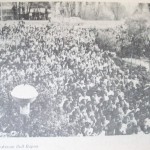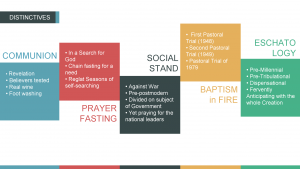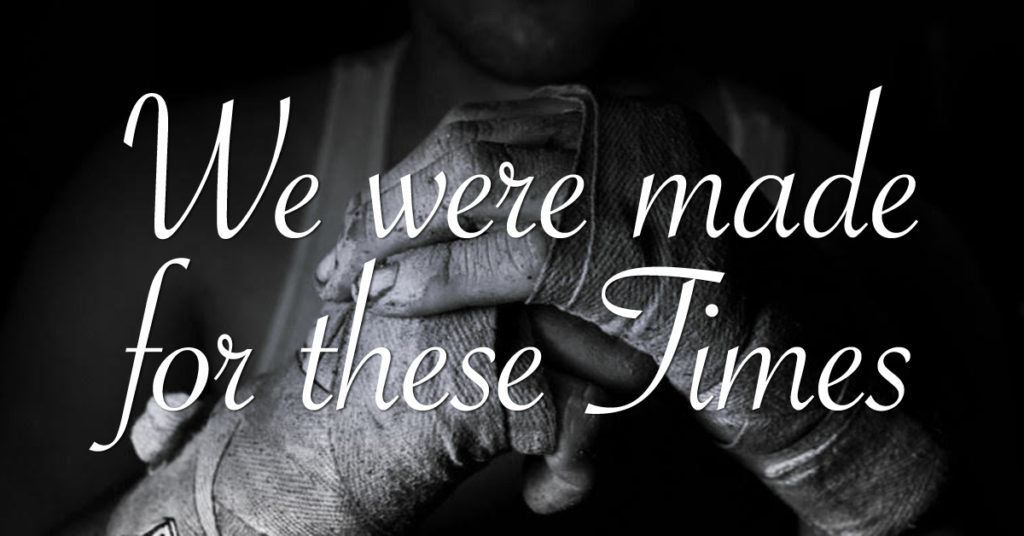We were made for these times
We were made for these times!
We know how to connect – whether in person or through phones and computers.
We know how to listen – to the stated message and to what is not said.
We also know the importance of responding to that unexpressed need.
We know how to observe – to see the fleeting worry or tender courage in someone’s eyes.
We know how to hope – to genuinely believe in our collective goodwill and shared humanity.
And, as you know, we know these things deeply and well – long before a contagious new virus arrived and disrupted our families and daily routines, we knew the powerfully contagious impact of relationships, positive emotions, and prayer!
Now, we want each of you to hear how much each of you is held in our hearts – for the work you do and, most importantly, for who you are in your families, communities, and the world.
Together we will remember the most vulnerable – near or far – and with creativity, determination, and compassion we will write a story of resilience, wholeheartedness, and collective resolve.
A story of and for these times.
We believe in you. Thank you for your continued prayers of support.
VBS for Adults
For reasons obvious to most of our readers, I was able to attend no less than 10 (ten) VBS/Kids crusades this summer. Seven Baptist, several Pentecostals and a Methodist one.
The themes ranged from jungle journey and the Lion King to giddy up cowboys and cowgirls and world/planet/time travelling. All cool themes with lots of props and much careful preparation all in the name of bringing the Good News to the little ones. A noble cause truly worthy of any expense and labor for any church out there.
Time and length ranged from one whole day or one evening service to three nights and even several week long ones. For most of it, the ones held in most Baptist churches were designed by LifeWay and were well structured with kids constantly moving from station to station. The rest were somewhat free style, but still designed with the expectation of lots of children attending. In between each module there was candy, snacks or even a full blown supper.
The location of each VBS and the way it was designed for the crowd flow made the initial impression important. Signs welcoming and directing newcomers were grate, but the friendliness of the people made up for less signage and more human touch. Registration was a must and parents’ preferences were not taken lightly. The decorations of each room helped the children adjust to the new setting and work through the set curriculum. And yes, lots of kids made lots of mess so cleanness in class rooms, play areas and bathrooms were tended to. Some churches had a designated team that made sure the facilities were clean for the next group. And where cleanness was not intentional, it was observed that many parents did not return with their children.
Most VBS programs were designed around age groups. Some included even classes for toddlers and several had adult classes too. The ones that did not, included a family night toward the end of the week for parents to attend. A family night was a great feature for parents who did not attend but dropped their kids every night and picked them up afterwards. They were addressed with materials and opportunities for a spiritual renewal.
The thematic VBSs progressed with learning daily and build up on the previous day. The groups of children toggled between Bible lesson, crafts, games and lots of music. Kids were greatly encouraged to participate and learn the songs and dancing, recite Bible verses and answer questions from the covered material. Some parents participated too.
Prayer was made a central focal point for most of the VBSs observed. The Baptists ones, especially, had pledges of allegiance at the start of the service and assembly with prayer toward the end. A memorable experience for all children who enjoy social setting, making new friends and learn the Bible.
Here are several take ways to observe for a VBS in your church:
- Prepare for lots of children – if you have it they will come
- Train your workers. Form teams for each task. Assign measurable goals to ensure smooth moving through the program
- Self designed VBS programs work as good as the paid ones, as long as designed with the children and families in mind
- Chose the length of the event carefully with regard of your constitutions. For the most of it, less is really more.
- Do not underestimate friendliness, cleanness and the safety of the children.
- Don’t miss a family day. Everyone likes hot dogs and water slides on a hot summer day.
This goes without saying, but focus on God – it is easy to lose track and purposes in the larger design of such events.
Prophetic Revival in Bulgaria: The Search for Holiness Continues
 The Fall of the Berlin Wall in 1989 did not take believers in the Eastern Block by surprise. They had been fervently praying for God to intervene and He did. Perhaps the greatest miracle of the 20th century was Communism falling on its own. If suffering with the Regime had been an eschatological expectation, the fall of the Regime was an eschatological celebration. And through all these times, the search for deep, biblical holiness after the heart of God never stopped. For the people of God, that search was always miraculous and prophetic.
The Fall of the Berlin Wall in 1989 did not take believers in the Eastern Block by surprise. They had been fervently praying for God to intervene and He did. Perhaps the greatest miracle of the 20th century was Communism falling on its own. If suffering with the Regime had been an eschatological expectation, the fall of the Regime was an eschatological celebration. And through all these times, the search for deep, biblical holiness after the heart of God never stopped. For the people of God, that search was always miraculous and prophetic.
I n the spring of 1989, a Danish journalist by the name of Johny Noer came to Bulgaria with a prophetic message. For years he had lived and travelled in many countries with his family and coworkers in a convoy of several trailers. They met the start of 1989 with a seven-day fast on the island of Pathmos where God told them to travel to Eastern Europe and proclaim the fall of the Regime. The Convoy did so through many difficulties paying a high price to minster in Bulgaria for the next three months.
n the spring of 1989, a Danish journalist by the name of Johny Noer came to Bulgaria with a prophetic message. For years he had lived and travelled in many countries with his family and coworkers in a convoy of several trailers. They met the start of 1989 with a seven-day fast on the island of Pathmos where God told them to travel to Eastern Europe and proclaim the fall of the Regime. The Convoy did so through many difficulties paying a high price to minster in Bulgaria for the next three months.
The last service they conducted before being extradited by the authorities was on Easter morning at the Black Sea port city of Varna. Thousands of believers arrived from all over the country. The use of an auditorium was not allowed so they gathered outside the small Pentecostal church at the cities outskirts. They were surrounded by a dense police cordon of several hundred K9 patrols. Under these circumstances, the sermon could only be short and simple. In fact, it contained the exact words the Communist Police forbade Pastor Noer to say: “Let My People Go!” A prophecy was given that Communism will soon fall. It was fulfilled exactly seven months later on November 10, 1989.
 But there was something else that happened at that memorable Easter morning. Two large scrolls were brought into the church. There, over 5,000 men and women signed their names as a testimony of their dedication to God and preaching the Gospel until revival breaks through in Bulgaria. Beside a petition to the government for religious freedom, this national declaration affirmed the search for holiness, which even Communism had not been able to stop in Bulgaria.
But there was something else that happened at that memorable Easter morning. Two large scrolls were brought into the church. There, over 5,000 men and women signed their names as a testimony of their dedication to God and preaching the Gospel until revival breaks through in Bulgaria. Beside a petition to the government for religious freedom, this national declaration affirmed the search for holiness, which even Communism had not been able to stop in Bulgaria.
In the fall of 2014 our ministry invited Pastor Johny Noer to Bulgaria again. His second visit marked exactly 25 years since the Fall of the Berlin Wall. After a week long crusade in a dozen of Bulgarian cities, several thousand Christians gathered again in Varna and signed two new scrolls containing the Second Varna Declaration. The event was just like a quarter of a century ago and made clear that revival cycles take place on increments of 25 years – a period where two generations overlap. It also proved that the search for holiness has not stopped in Bulgaria.
Read Also:
PRAYER for the NATIONS in London
Baptism in the Fire of Persecutions as the Final Stand for Holiness
 Historical and Doctrinal Formation of Holiness Teachings and Praxis among Bulgarian Pentecostals (Research presentation prepared for the Society of Pentecostal Studies, Seattle, 2013 – Lakeland, 2015, thesis in partial fulfillment of the degree of D. Phil., Trinity College)
Historical and Doctrinal Formation of Holiness Teachings and Praxis among Bulgarian Pentecostals (Research presentation prepared for the Society of Pentecostal Studies, Seattle, 2013 – Lakeland, 2015, thesis in partial fulfillment of the degree of D. Phil., Trinity College)
The eschatology of the first Pentecostals in Bulgaria was definitely Premillennial, built around the suffering of the church and the coming final deliverance. “Christ shall return in person,” not just in spirit or presence, read the Pentecostal Union’s first Declaration of Faith. But first they were to be tested in a baptism of fire…
After the 1923 unrest in Bulgaria, Pentecostal missionary Dionesy Zaplishny was abducted, severely beaten and held in a well for a week. His health was never the same and he passed away at an early age in 1935. But this was only the beginning of the persecution upcoming with the Communist Regime.
Bulgaria’s Pentecostal movement entered the oppression period split and divided. The westernized denominational structure, which Nikoloff proposed in 1928, never fit the existing Pentecostal churches and was unable to unite them as a whole. When the communists took over in 1944 they used the existing church defragmentation to infiltrate and manipulate the congregations. Thus, the eschatological suffering of the church experienced its prime under Communist dictatorship.
In 1948-49 two consecutive trials targeted evangelical pastors effectively sentenced fifteen of them and virtually beheading the evangelical movement in Bulgaria from its leadership. When a new generation of leaders became involved some 30 years later, another similar trial imprisoned six of them in 1979. The evangelical churches were left without any leaders, except the ones placed under the control of the communist state. The congregations that refused to accept them were outlawed and marginalized with no contact with the outside world. But through all these trials and tribulations, the believers learned how to survive the persecution and overcame…
Pacifism as a Social Stand for Holiness among Early Bulgarian Pentecostals
 Historical and Doctrinal Formation of Holiness Teachings and Praxis among Bulgarian Pentecostals (Research presentation prepared for the Society of Pentecostal Studies, Seattle, 2013 – Lakeland, 2015, thesis in partial fulfillment of the degree of D. Phil., Trinity College)
Historical and Doctrinal Formation of Holiness Teachings and Praxis among Bulgarian Pentecostals (Research presentation prepared for the Society of Pentecostal Studies, Seattle, 2013 – Lakeland, 2015, thesis in partial fulfillment of the degree of D. Phil., Trinity College)
When Pentecostalism began to spread rapidly in Bulgaria in the 1920s, it was viewed hostile as by both Protestant and Orthodox traditions. Not fasting during lent and not sacrificing for the dead, not honoring Mary or the saints was all detrimental in the formation of the identity of Pentecostal churches in Bulgaria. Even insignificant things like not wearing a cross, or not making the sign of the cross and not lighting candles and incense were noticed and severely criticized by the surrounding culture. And of course not drinking alcohol in Bulgaria and the Pentecostal abstinence was met with enormous opposition from other religious groups. Along with that any benevolence, social involvement, spiritual upbringing of minors (including sport actives) was all condemned as harmful protestant propaganda.
But one specific evangelical stand could never be forgiven – the protestant pacifism in the form of conscientious objection against carrying arms. For the newly re-born Balkan state, in a place where war has been ongoing for centuries, to refusal to go to war was essentially to refuse to be a Bulgarian.
The pacifism of Bulgaria’s evangelicals was silent but powerful against both Hitler’s fascism and the militant atheism of the coming Communist Regime. Their deep Christian conviction simply did not allow them to kill, carry a weapon, imprison another human being, swear allegiance to the communist state or take orders from another authority but God. And for their stand, many ministers and believers paid a heavy price. About 40 ministers and members of the Bulgarian Church of God alone were sentenced to hard prison labor for noncompliance with the mandatory military service. Hundreds more known and unknown believers from other evangelical churches followed.
Missions for the Third Millennium (2009-2010)
This is a re-post of popular articles on Missiology from 2009-2010:
M3: Missions for the Third Millennium – A Public Position (2010)
8 Simple Rules for Doing Missions in the Spirit (2009)
Church of God Eastern Europe Missions: Leadership, Economics and Culture (2009)
Repost: Ministry NOT for Sale
 My son, if sinners entice thee, consent thou not (Proverbs 1:10)
My son, if sinners entice thee, consent thou not (Proverbs 1:10)
Several years ago, while employed with a certain organization, we faced the dilemma to choose between what was morally right and what was financially secure. Regardless of the jeopardy of this predicament, we were able to make the right decision, preserving our integrity and disallowing financial pressure to dictate our moral choices. Soon thereafter, we initiated a healing process which dealt with the internal wounds, restored the lost trust and attempted to recover the invested time and resources. Years past, we forgot the pain, but never forgot the lesson we learned …
Recently, while involved in a global ministry campaign, we were faced with a similar situation. This time, however, it did not involve business partners, but a multitude of Pentecostal ministers. The larger size of the context did not change the problem at hand, but rather intensified and multiplied its harmful effects. We regretfully witnessed how hundreds of men and women involved in ministry were manipulatively forced to face the same dilemma. They had to make a mandatory choice between the financial security of their families and their own moral integrity. The results were accordingly. Read more
12 Benefits from Walking in the Desert for 40 Years
1. You lose excessive weight you don’t need
2. You lose treasures/gold you thought you needed
3. You go on God’s diet
4. You learn your true friends/brothers and sisters
5. You learn to trust God daily
6. You learn to keep walking
7. You see your enemies defeated by God
8. Walking in the desert takes you to the top of God’s mountain where you meet God
9. Your children receive the Promise Land
10. There is a generational genetic cleansing of unfaithfulness. When the faith of a generation grows, the faith of the nation increases
11. You learn to walk in unity or you get lost and die alone
12. You begin to appreciate the small things in life (like bread and water)
On PRAYER for REVIVAL
Corrie Ten Boon: “A man is powerful on his knees.” [Corrie ten Boom (1892-1983)]
Martin Luther: “Prayer is not overcoming God’s reluctance, but laying hold of His willingness.”
Charles Spurgeon: “He who lives without prayer, he who lives with little prayer, he who seldom reads the Word, and he who seldom looks up to heaven for a fresh influence from on high — he will be the man whose heart will become dry and barren.”
Mother Teresa: “More tears are shed over answered prayers than unanswered ones.”
Mary Queen of Scots said she was more afraid of the prayers of John Knox than of an army of ten thousand men. The word of Knox’s prayer were: “Give me Scotland or I die…”
John Wesley: “Give me one hundred preachers who fear nothing but sin and desire nothing but God, and I care not a straw whether they be clergymen or laymen; such alone will shake the gates of hell and set up the kingdom of heaven on earth. God does nothing but in answer to prayer.”
One man at the Azusa Street Revival said, “I would have rather lived six months at that time than fifty years of ordinary life. I have stopped more than once within two blocks of the place and prayed for strength before I dared go on. The presence of the Lord was so real.”












